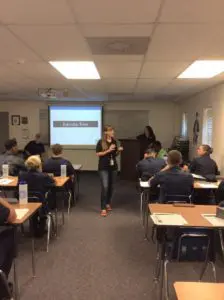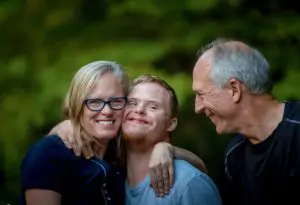First Responders Training
What is the Ethan Saylor First Responders Training?

Prompted by Ethan Saylor legislation (SB0853, CH0387), The Arc and their People On The Go advocates became involved in training law enforcement, EMS and other first responders to become better equipped to serve individuals with intellectual and developmental disabilities (IDD) in our community.
Trained facilitators and self-advocates incorporate role-playing and real life scenarios to demonstrate how to approach, deescalate and resolve matters involving people with IDD. We also work with community partners to facilitate interactive and inclusive training sessions, providing an opportunity for people with IDD to participate and learn how to safely manage an encounter with first responders.
Training objectives, as indicated by the Maryland Police & Correctional Training Commission:

- Identify the procedures that an officer should/may employ when encountering an individual with an IDD
- Identifying the difference in procedures used when encountering a person with an IDD as an offender, victim, witness, or individual in need of assistance and how these roles may overlap
- Identify the need to exercise ethical leadership when encountering an individual with IDD
- Identify the indicators that a person may have an IDD
- Identify why it is important for officers to be aware of people with an IDD, the prevalence of IDDs and the need to reduce stigma
- Identify what is meant by hidden disabilities
- Describe general behaviors associated with persons with an IDD
- Identify non-verbal distractions, both personal and environmental, that may affect an encounter with a person that has an IDD
- Identify the difference between a person with an IDD and a person with a mental illness
- Identify the procedures an officer should follow to ensure the safety and calmness of an individual that has an IDD
- Explain the impact of prior trauma on interactions with a person who has an IDD (i.e. Trauma Informed Care)
- Describe what it means to be safe from the perspective of people with an IDD, the officer, and community
- Identify procedures used to ensure a safe outcome for individuals with IDD, officers, and communities
- Describe the impact of an officer’s attitude and actions toward people with an IDD on the public
- Identify the officer’s ability to use discretion when encountering a person with an IDD to resolve an incident with respect and understanding
- Identify the medical and physical vulnerabilities commonly associated with a person with an IDD and the impact on a safe outcome
- Describe the importance of using community resources to assist the officer
For more information and to apply for services, visit the:



